Covid-19: What life will be like for the unvaccinated in Singapore


Late last month, Madam L. Chang, 59, joined her regular group of tennis players for their weekly game at a public sports hall.
To her surprise, she was denied entry because she was not officially vaccinated, even though she had taken the Sinovac Covid-19 vaccine. After protesting, she was segregated and allowed to play a singles match with another unvaccinated friend, instead of the doubles she usually plays.
"It was fine with me. At least my trip was not wasted," says the real estate agent.
Now that Sinovac is on the list of recognised vaccines here, Madam Chang no longer frets over the potential loss of activities she used to take for granted, including dining out with her husband and two grown-up children, aged 22 and 32, all of whom have taken the Pfizer jab. She has another daughter, aged 29, who is based in Malaysia.
She is "happy that reason prevailed", although she worries about the "long-term safety of the new mRNA vaccines" her family has taken.
Life for her will return to some level of normal, but how will the future play out for others who cannot, or will not, be jabbed? Will it just be a series of minor daily inconveniences or could they face discrimination in jobs and social isolation down the line?
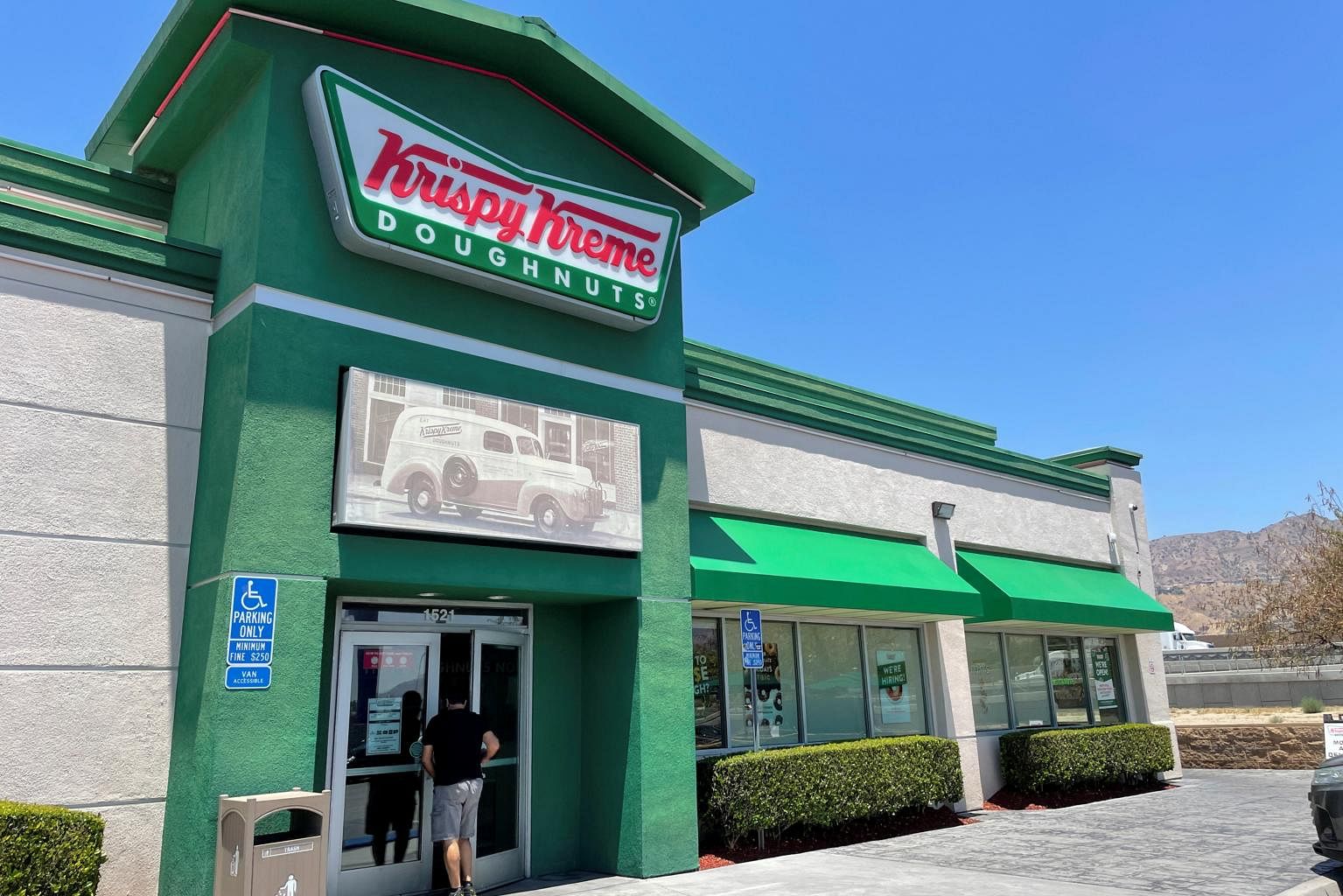
Here's a look at how other places encourage vaccination reveals both carrot and stick approaches.
Incentives by the public and private sectors range from the useful (gift cards in some American states) to the creative (a free Krispy Kreme doughnut every day until the end of the year for Americans and unlimited Qantas flights for a year for Australians).
There is also the aspirational - California residents stand to win US$1.5 million (S$2 million) in cash, while those in Hong Kong can aim for a chance at a HK$10.8 million (S$1.9 million) one-bedroom flat.
[[nid:541326]]
Countries from Israel to Italy have issued or are planning to launch various forms of green passes or vaccine passports, which grant the vaccinated access to more activities and venues than their unprotected peers.
In France, for instance, you cannot dine out, visit a hospital (unless it is an emergency) or travel on a long-distance train without a Pass Sanitaire.
Even Britain, which has loosened many Covid-19 restrictions since last month, will make full vaccination compulsory for entry into discos and other large venues from the end of next month. This is to encourage young people to get their Covid-19 shots.
Such measures are similar to the situation in Singapore, where the fully vaxxed (90 per cent of the eligible population by next month) can now enjoy a restaurant meal in a group of five, take off their masks when exercising indoors and attend large-scale events. They may also holiday overseas when the travel lane with Germany opens next month.
Companies from hotels to food and beverage outlets have also used the vaccination programme as a marketing platform to offer a bevy of discounts, freebies and promotions.
Such perks are not meant to discriminate, stressed Health Minister Ong Ye Kung in an exclusive interview with The Straits Times last month.
He explained that the differentiation between the vaccinated and unvaccinated is necessary from a public health standpoint as the nation moves towards a sense of normality.
That has not stopped a vocal minority from opposing the measures. Almost 12,000 people have signed an online petition calling for an end to "complicated and divisive" rules on social gathering and dining, among other requests. Anti-vaxxers have turned to social media, particularly the Telegram app, to find kindred spirits.
In the nearly two weeks since dining out was allowed once again, it seems to have become a case of the vaxxed versus the vexxed.
Restaurateurs have shared on social media their stories about unvaccinated patrons trying to pass off other people's vaccination status as their own, or suffering abuse from patrons who were angry at being unable to dine at their outlets.
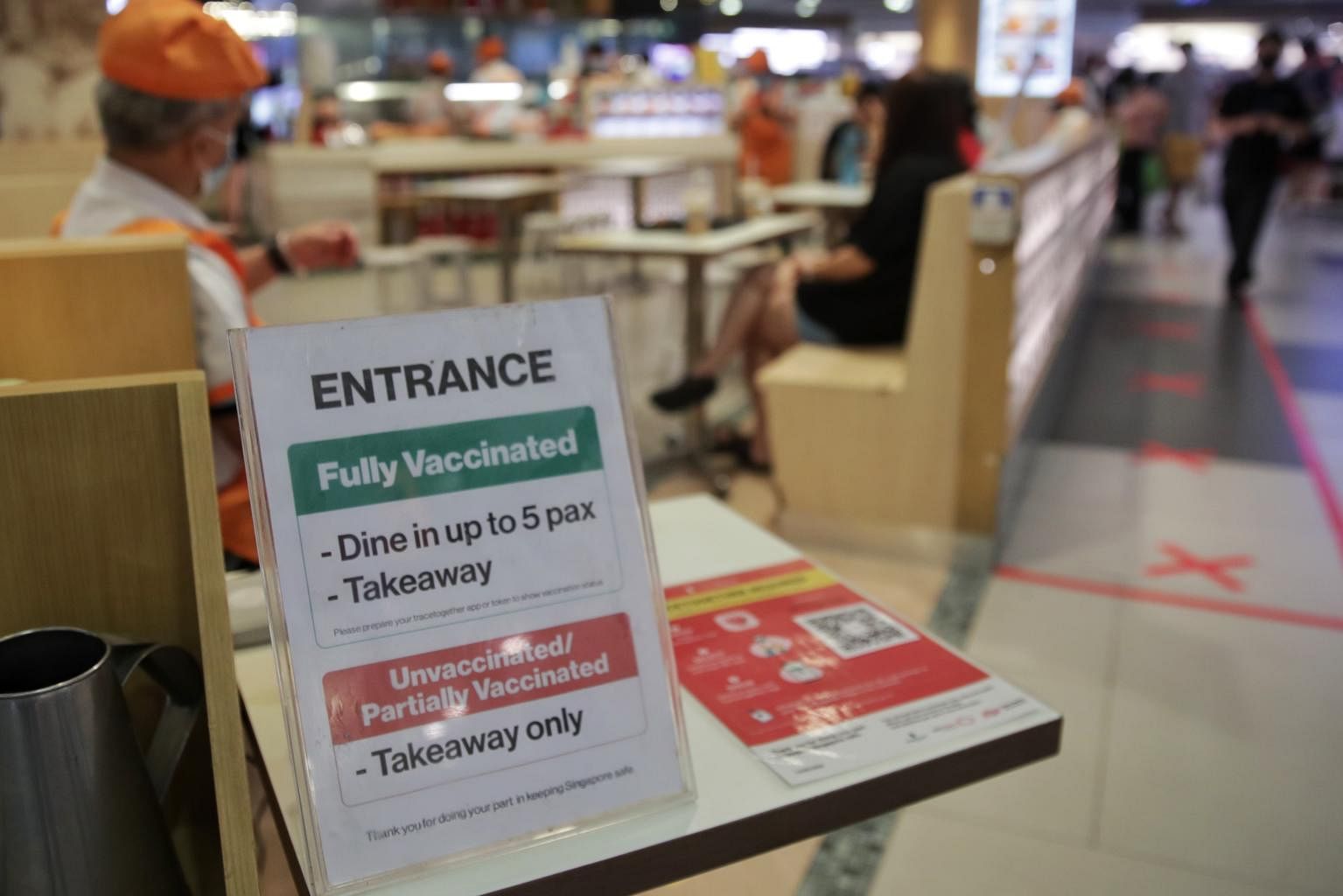
The situation seems less fraught in fitness centres.
Mr Sean Tan, director of True Group and president of the Singapore Fitness Alliance, says it has adopted a "graduated, phased approach to full mask-off facilities". More than half his employees and "a number of our members" are not considered fully vaccinated yet, but will be in the coming weeks.
"For the minority who will remain unvaccinated, we would like to see what measures can be rolled out for those who are unable to be vaccinated for medical reasons," he adds.
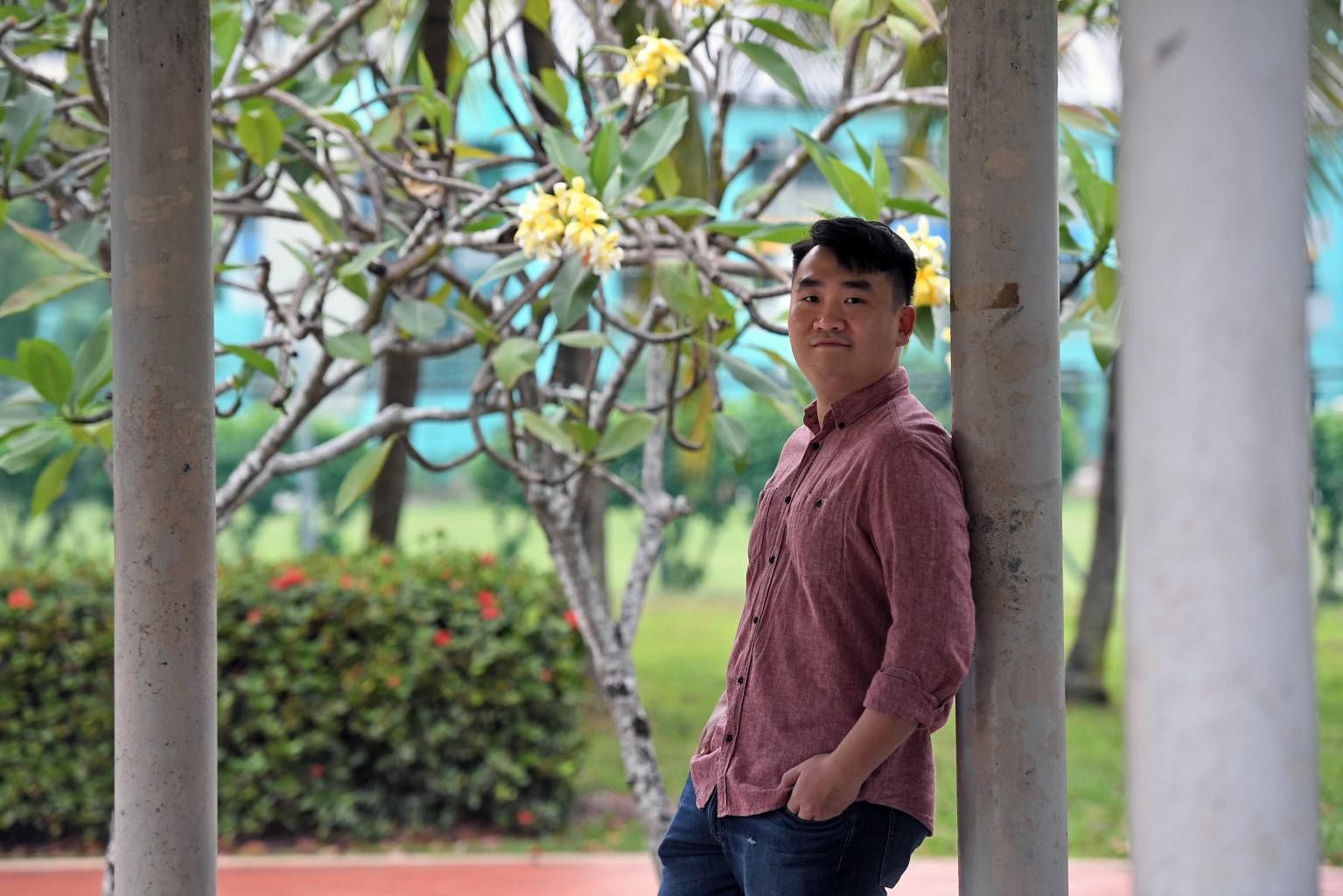
Public relations consultant Max Huang, 27, cannot dine out with many of his friends, who have not taken their second dose or who still have to wait for two weeks before being considered fully vaccinated.
"Many of us have been going back to how we were hanging out during circuit breaker last year, meeting via video calls, virtual drinks and such," he says.
"While it's a slight inconvenience, we're just thankful when we look at the situation overseas. While many are still in full lockdown, we just have to wait a few more weeks to dine out together again."
Mr Huang took the Sinovac shot at his mother's insistence when it was first offered, but was taken aback when the Government did not recognise it as part of the official vaccination programme initially.
[[nid:541206]]
He even wondered if he could "remedy the situation" by being vaccinated again with the Pfizer or Moderna versions so he could resume activities like dining out.
"I'm definitely relieved to find out about the news (on Sinovac), though it does feel like everyone was taken on a bit of an emotional roller-coaster ride with the back-and-forths. However, I do empathise given the volatility caused by the Delta variant," he adds.
She is unvaccinated by choice and adds that she is waiting for "version four" of the jabs, half in jest.
The marketing director reasons that there is "no real urgency" to get jabbed because of the way she has structured her life to run virtually, from working to buying groceries to exercising. Everything happens within her three-room flat in Bedok.
Her friends have asked her to take the jab so they can dine out together, but now visit her home instead since she cannot join them.
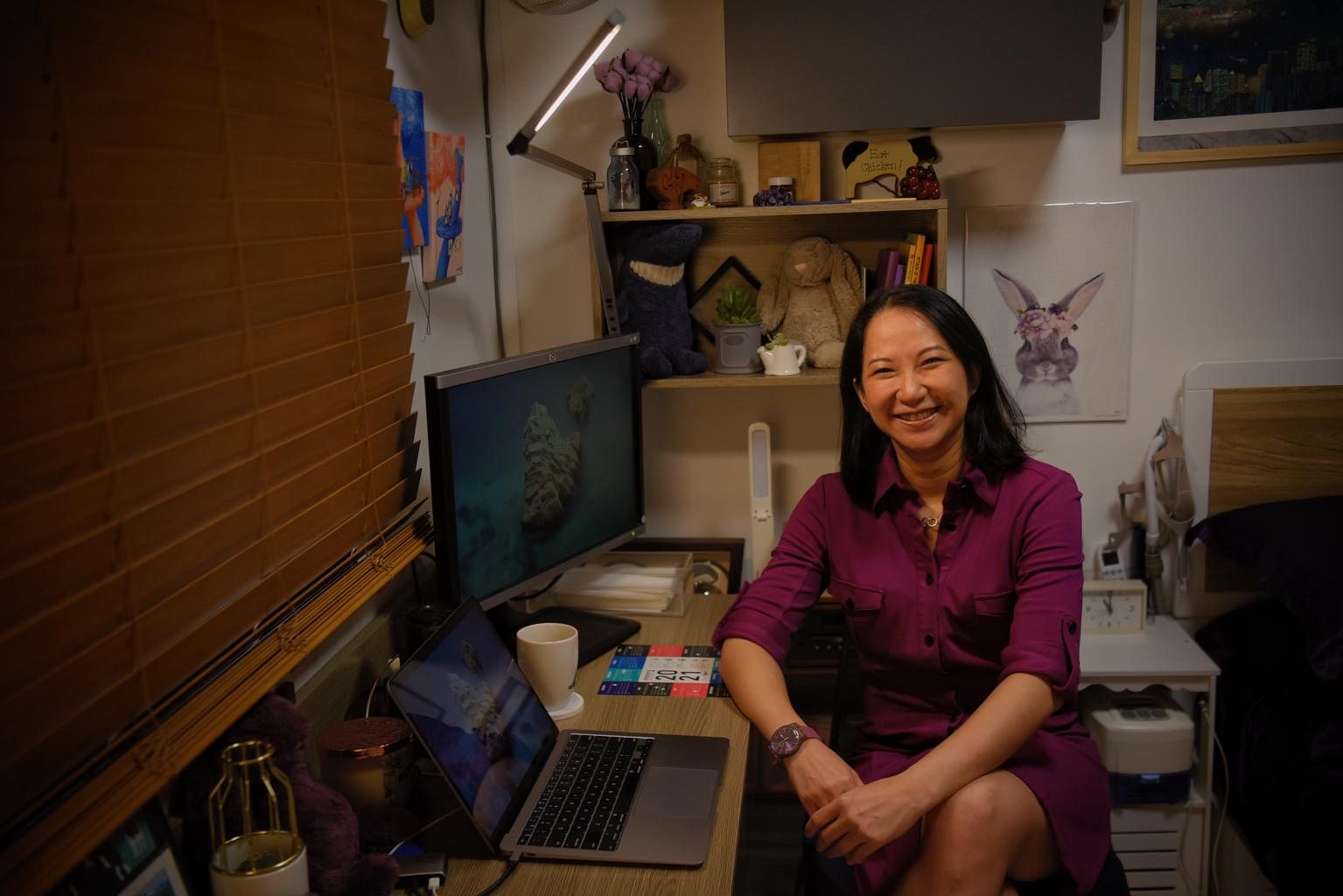
She says her decision "hasn't really impacted" her marketing services business.
"If I were the owner of a shop, I would have no choice, but my business is purely online," says Ms Sim, who reckons she is low-risk as she "does not fall sick easily".
She lives with her 71-year-old father, who "doesn't care because he's vaccinated", she says.
"I think I've been a lot more focused now, when nobody's calling you at random times and saying, 'Hey, are you free for coffee or tea?'" she says.
While some anti-vaxxers cry foul, experts say it is not about taking away their personal freedoms, but rather, promoting social responsibility.
As Professor Lawrence Loh, director of the Centre for Governance and Sustainability at NUS Business School, puts it: "The last thing we want is to have a social divide based on vaccination status. But if soft-selling does not work and we do not want to go the mandatory vaccination route, the incentive method may help.
"This is not about taking away from the unvaccinated but recognising the vaccinated, in the same vein that incentives are currently given based on demographic or economic criteria.
"This is not about Robin Hood taking from one group and giving to another."
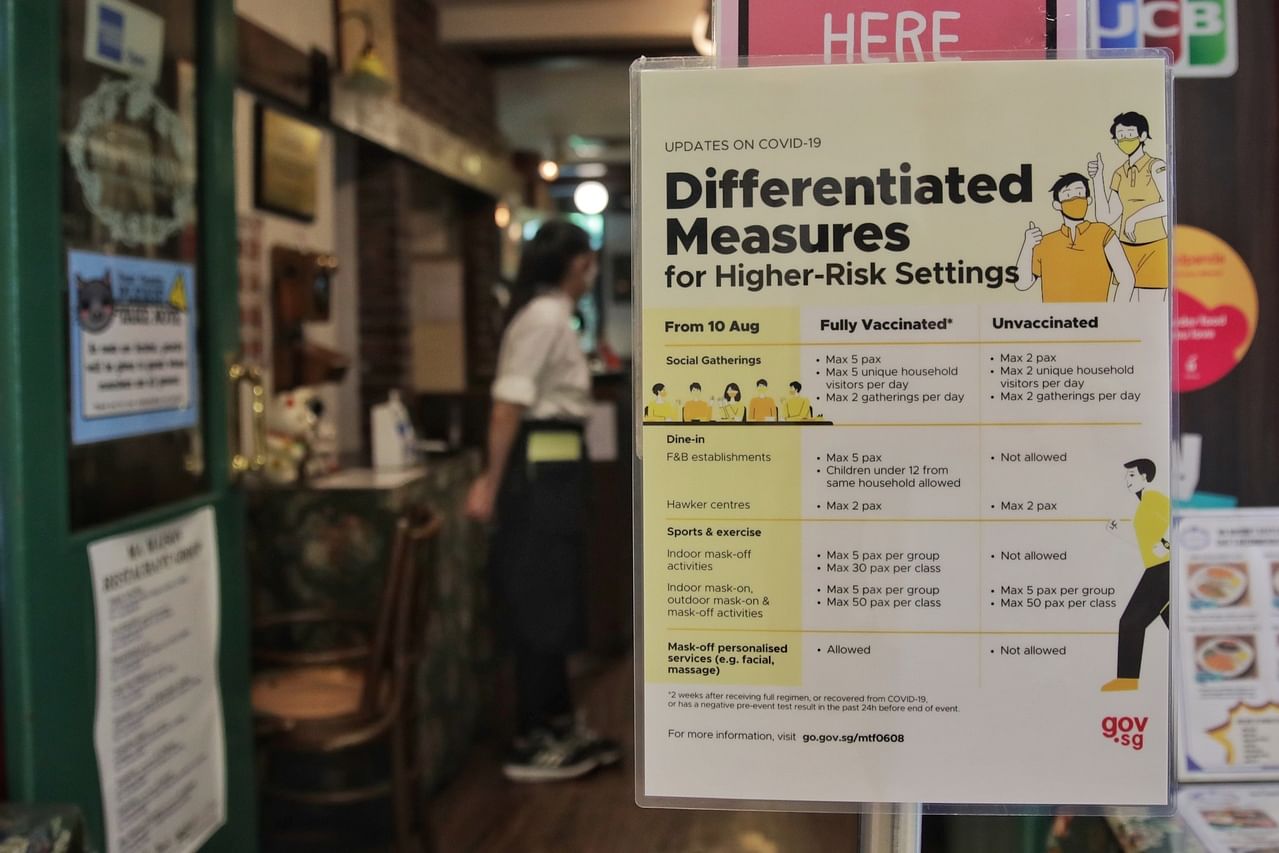
Rather than meting out punitive measures for the disgruntled, a more nuanced approach may work better.
Professor Paulin Straughan, a sociologist from Singapore Management University, says: "I suspect in Singapore, it is ignorance and fear that are causing a divide. So we do whatever we can to allay the fears - through support, education and encouragement."
While vaccine-differentiated social management measures are necessary in the journey towards herd immunity, she stresses that it is important to remember the needs of those who cannot get their shots for medical reasons.
"For these, wherever possible, we should try to facilitate their inclusion, perhaps in smaller group settings. I am most concerned about seniors who cannot be vaccinated and their social isolation if they are not given access to social activities," she adds.
[[nid:541196]]
Ms Venessa Chua, 33, is among those not fully vaccinated because of health reasons. She suffers from an autoimmune condition and was hospitalised for 10 days after suffering a rare reaction to her first dose of the Pfizer vaccine last month.
"The doctors used strong steroid treatment to lower my body's immune response to the Pfizer vaccine, which was starting to attack my liver and bone marrow," she explains, adding that they are reviewing her options for a non-mRNA booster.
This means that, for now, she cannot dine in at a restaurant with her husband Kenneth Koh, 35, an aerospace quality manager, and their one-year-old son, Elijah, unless she pays beforehand for a negative pre-event Covid-19 result from an approved test provider.
"The restrictions feel like a reasonable compromise in order to allow the country to reopen, while trying to protect the public from Covid-19. As I am still vulnerable to Covid-19, I am already taking steps to protect myself so the restrictions have little impact on my daily life," she reasons.
"Mostly, I miss meeting my friends in large groups, but I do understand the risks of attending big gatherings. Even if the vaccine did work for me, I would probably still be avoiding large crowds."
The banking executive works from home unless she has to meet clients and visits the hospital every three days for ongoing check-ups. She does not feel "discriminated against" so far and has been heartened by the reactions from those near and dear to her.
"During this time, I have received messages of support from friends and family who are worried for me. While I have been missing out on gatherings at nice restaurants, everyone has been really understanding and they occasionally bring takeaway food to my home. This allows me to avoid crowded areas during meal times."
She adds: "I understand that my adverse reaction to the Pfizer vaccine is a rare occurrence. As much as it was a frightening ordeal for me, I would still encourage others to get vaccinated to protect themselves and the people around them."
Could being unvaccinated cost you your job?
In the United States, companies such as Walmart, Google, Disney and Microsoft have started requiring vaccinations for some or all of their employees. This has prompted praise from the White House as the country battles surges of Delta variant cases.
[[nid:541129]]
That is unlikely to happen here as "employers cannot legally require employees to disclose their Covid-19 vaccination status or mandate vaccinations. While vaccination is strongly encouraged in Singapore, it remains voluntary", says Mr Neil Narale, partner and health leader in Singapore for consultancy Mercer.
However, working conditions for the unvaccinated in front-line positions will become more onerous - in terms of trouble and cost.
The Government said earlier this month that front-line workers in some high-risk sectors, such as healthcare, food and beverage, fitness and personal care services, as well as public service, must be vaccinated by Oct 1. If not, they must take an antigen rapid test twice a week. These tests will be subsidised only if they are medically ineligible for the vaccines.
Earlier this week, local budget airline Jetstar Asia became the first carrier to require all its employees be vaccinated. It added it would look into alternatives for staff who cannot take their shots for health reasons.
The Ministry of Manpower told The Straits Times last Thursday that it will issue an updated advisory soon with the aim of protecting more workers.
[[nid:541007]]
Still, Mr Narale sees a "low risk" of workers being discriminated against because of their vaccination status.
"With a shortage of talent in Singapore, it's more important than ever that employers continue to practise equal opportunity and focus on attracting and retaining key talent, providing them with a safe and supportive environment to grow," he says.
"Managers need to be careful not to exclude unvaccinated employees from meetings or opportunities simply because their presence requires protective measures. That is especially true for employees who may decline to get vaccinated due to a medical condition or personal reasons."
At the end of the day, it is about "balancing the rights in the social setting - freedom must be coupled with responsibility", says Professor Lawrence Loh, director of the Centre for Governance and Sustainability at NUS Business School.
"Jabs and jobs will go hand in hand - if workplaces are frequently inflicted with Covid-19 infections due to workers not taking the jabs, there may be no jobs for all if the organisations go down."